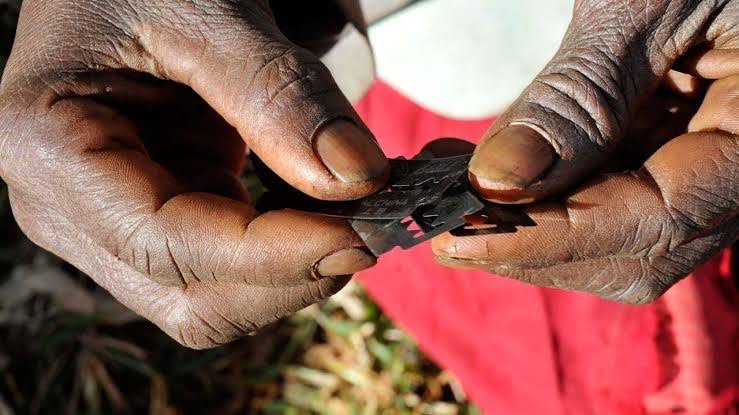[ad_1]
One could almost feel the intensity of her emotions as Osarieme Oziegbe, 28, told the story of her birth and recalled the ugly consequences of the removal of her clitoris (genitalia) by a nurse in Benin City, Nigeria, as narrated to her by her mother.
The nurse had convinced Ms Oziegbe’s mother to circumcise the new baby as part of the cultural rites of the Binis. She told her that it validates the birth of a girl child.
Ms Oziegbe said: “I learnt that after my delivery, and the counselling by the nurse, my mom agreed to cut my clitoris but that she almost lost me because I bled uncontrollably. Thank God, I survived it.’’
Ms Oziegbe told PREMIUM TIMES that she was struggling to deal with broken relationships because of her lack of interest in sexual activity. She said she did not understand why she had never found the thrill of sex as talked about by her peers until she began asking questions.
“There were times when I had young men getting close to me and seeking intimacy, but honestly, the urge wasn’t there. I never felt anything; my first sexual experience wasn’t fun. I always asked myself why people refer to sex as one of the best feelings in the world. I didn’t get the excitement, I understood that it wasn’t any of those.
“Even at times I tried to explore my own body by touching myself, yes the urge comes, but within a few seconds, it’s all gone, I lose interest,” she added.
Ms Oziegbe believes her sexual experiences stem from the removal of her clitoris.
About FGM
Female Genital Mutilation (FGM), the removal of part of the whole of the clitoris, is a form of discrimination against women and girls. It is said to be one of the most inhuman acts of gender-based violence (GBV) perpetrated against women, and a violation of their human rights.


The process of FGM is mainly carried out by traditional circumcisers, who often play other central roles in communities, such as attending childbirths. However, in some parts of Nigeria, healthcare providers perform FGM. The procedure is considered safer when performed by trained healthcare providers.
However, the World Health Organisation (WHO) strongly advises healthcare providers not to perform FGM because of the numerous short- and long-term effects, which are often negative and can cause permanent damage to the victims or survivors.
Some of the immediate effects of FGM, as highlighted by David Osifo, a medical doctor and former commissioner for health in Edo State, are infections and bleeding, “especially when done in the local setting, which can sometimes result in death.”
Is FGM a solution to promiscuity?
There is a popular belief among the people of Bini in southern Nigeria that an uncircumcised female is a taboo. Circumcision in this part of Nigeria is a mark of cultural identity, supposedly done to prevent promiscuity among young women/girls. They also believe that circumcision is hygienic and allows for safe delivery during reproductive age.
Proponents believe that new babies could die if they make contact with an uncut clitoris during delivery.
Blessing’s ordeal
Some of the reasons used to justify the act of FGM in Nigeria are to ‘preserve virginity, curb promiscuity, and prevent extra-marital sex or to protect female modesty and chastity. But the big question is; does FGM really curb promiscuity?
Unlike Ms Oziegbe who lacks interest in sexual activities, Blessing (real name withheld) is one of many Bini women who have suffered from societal backlash and stigmatisation for engaging in intercourse with several partners.
While sharing her story with PREMIUM TIMES, Blessing explained how girls who tend to be very sexually active and keep multiple partners often end up with demeaning name tags such as ‘ashawo’ (prostitutes) due to their busy sex lives.
She said: “I thought I was a sex addict because I always felt like I couldn’t control the urge; I would do anything to get to a man. Yes, it got me into so many troubles; I always had to lie to my parents, I kept late nights, I got talked about. That was the most painful part I faced, backbiting.”
Blessing believes being cut early influenced her choice of multiple sexual partners; as she needs multiple partners to reach orgasm.

Mr Osifo agrees that that could be a reason.
According to Mr Osifo, the former health commissioner, who now works at the University of Benin Teaching Hospital (UBTH), the presence of the clitoris stimulates the woman and drives her to an early orgasm.
“However, the absence of the clitoris as a stimulator makes it difficult for the woman to climax to orgasm,” he said.
The gynaecologist explained that once a man or woman reaches orgasm, they lose interest in sexual urges for some time. But females who are circumcised lack the stimulation that initiates orgasms and are likely to stay longer during sexual intercourse.
This reality he said brings to light the extent to which FGM can influence the sexual relationships of survivors and how they cope with the sexual and physical challenges prompted by the practice.
Obazee Imafidon, a gender advocate, explained that one of the reasons sexually active women can not stick to one sexual partner at a time is because of the lack of the stimulator (clitoris), which creates an intimate bond between both parties.
“Whenever they are having intercourse, the man feels the sensitivity that takes him to the peak, but the woman has no limit and expects more. So, in a nutshell, FGM doesn’t help the female gender; it harms them.”
FGM prevalence
Also known as Female Genital Cutting, FGM involves the partial or total removal of external female genitalia or other injuries to the female genital organs for non-medical reasons. It can cause severe bleeding and problems urinating, complications during childbirth and an increased risk of newborn death.
FGM has a lot of other effects on the sexual reproductive health of women and girls. One is the resulting limitation on or the inability of survivors to use some parts of the genitals.
With an estimated 19.9 million survivors, Nigeria has the third-highest number of women and girls who have undergone FGM worldwide (accounting for 10 per cent of the 200 million FGM survivors worldwide). The prevalence of FGM is highest in the South-east (35 per cent) and South-west (30 per cent) and lowest in the North-east (six per cent).

FGM has a lot of effects on the sexual reproductive health of women and girls. One is the resulting limitation on or the inability of survivors to use some parts of the genitals.
Others include severe bleeding and problems urinating, later cysts, infections, complications in childbirth and an increased risk of newborn deaths.
Other long-term effects of this traditional practice, according to Mr Osifo, include epidermal inclusion cyst or clitoridal cyst, which he said is the most common. “This infection results in the clitoris developing a swelling that continues to grow and sometimes looks like a penis.”
The gynaecologist said many victims, as a result of this, formulate psychological effects associated with having such a bulge in their perineum.
FGM as a form of sexual disability in women
A disability means any condition of the body or mind (impairment) that makes it more difficult for the person with the disorder to do certain activities in the same way as most people.
There have been several types of research on the nuances and impacts of disability. Still, a primary under-explored form of disability is Female Genital Mutilation (FGM) and how it affects the sex and sexuality of women and girls. Are victims of FGM experiencing a form of disability, and how are their lives affected by it?
There is the argument that FGM can be considered a disability as it is a measurable impairment that interferes with a woman’s ability to use some of her body parts.
This argument notes that victims of this harmful practice face immediate consequences and possibly long-term effects, including the loss of sexual functioning. As such, women who have undergone FGM, like other people with various forms of disabilities, evolve multiple strategies that help them cope with this disability.
According to Mr Osifo, the total removal of the female genitalia often ends up being a disability in women when the labia minora is completely removed and makes it difficult for the survivors to be impenetrable during sexual intercourse. There are also the effects of loss of sexual desires in most women.

‘’In some cases of FGM, the vagina ends up closed and not pliable the way a normal vagina would be, making penetration and childbirth a problem. I have had to reconstruct even girls who got married, and there is no hole at all. They got married, and their husbands could not penetrate or find a way in; we then have to reconstruct the vagina hole for them to gain access,” the medical expert said.
He added that others who can manage to have sexual intercourse usually have difficulty during childbirth “because the vagina cannot expand to accommodate the babies. We then have to do an episiotomy to deliver the babies.”
Are anti-FGM laws working?
International instruments such as the Universal Declaration of Human Rights (UDHR), the Convention on the Rights of the Child (CRC), the International Convention on Economic, Social and Cultural Rights (ICESCR), and the Beijing Declaration of 1995, provide a framework for the promotion and protection of the rights of women and girls.
They require countries including Nigeria to provide an effective framework for the protection of the rights of women and girls. This is amplified by regional instruments such as the African Charter on Human and Peoples’ Rights, and the Protocol on the Rights of Women in Africa, 2006 (the Maputo Protocol).
By virtue of the Nigerian constitution, the ratification of international treaties and instruments, and the adoption of the SDGs framework; Nigeria is under obligation to respect, protect and fulfil the rights of women and girls. However, the rights of women and girls remain adversely impacted by negative and harmful traditional practices, including FGM.

“Laws against FGM in Nigeria only on paper”
Ronke Ojekere is an executive member of the Edo State Gender-Based Violence Management Committee. She has over the years worked on projects that seek to protect women and girls in Edo from harmful practices. While highlighting some of the laws that criminalise FGM in the state, Mrs Ojekere decried low implementation of these laws, saying they exist only on paper.
While accusing traditional birth attendants and community health workers of being enablers of FGM, the GBV expert called for more sensitisation to educate rural dwellers about the dangers of the act.
She cited the case of a woman who had refused circumcision for her child, but while unconscious, her mother, in connivance with the birth attendant, went ahead to cut her girl child without her permission. In this case, Mrs Ojekere questioned the extent to which the law can be evoked, saying it would be unfair and irrational for the woman to sue her mother for the act.
Also speaking on the role of anti-FGM laws in protecting women and girls against any form of violation, the chairperson of the Edo State chapter of the International Federation of Female Lawyers (FIDA), Violet Olumese, said significant milestones have been recorded in the implementation of policies such as the Violence Against Persons Prohibition (VAPP) Act over the years, including the enactment of the legislation.
According to her, the challenges remain in the elimination of this practice throughout the country. “Thus, it is imperative that the policy be reviewed and a new one developed to provide the basis of actions/steps that will drive the implementation of interventions.”

The Nigerian Constitution provides in Section 34 that “no person shall be subjected to any form of torture, inhuman or degrading treatment or punishment.” Legal experts believe that FGM falls under the preceding categories and thus can be punishable under the section.
The Child Rights Act (CRA), passed in 2003 in Nigeria, also has some provisions that outlaw this practice. Section 11(B) of the Act also provides that “no child shall be subjected to any form of torture, inhuman or degrading treatment or punishment.” These laws build on existing gains and address emerging gaps and challenges in the elimination of this harmful practice and human rights violation. It also provides a foundation for further actions to ensure the elimination of FGM in Nigeria.
Global efforts to end FGM
In 2007, the United Nations Population Fund (UNFPA) and the United Nations Children’s Fund (UNICEF) initiated the Joint Programme on Female Genital Mutilation/Cutting to accelerate the abandonment of the practice.
In 2008, WHO and nine other United Nations partners issued a statement on the elimination of FGM to support increased advocacy for its abandonment. Tagged “Eliminating female genital mutilation: an interagency statement,” it provided evidence collected over the previous decade about the practice of FGM.
The procedure is mainly practised in the western, eastern, and north-eastern regions of Africa, in some countries in the Middle East and Asia, and among migrants from these areas. FGM is, therefore, a global concern that needs urgent attention.
Gender experts like Oyin Nwabuzor, the national coordinator of the Association Against Child Sexual and Gender-Based Violence, admitted that there is still a large gap to fill in eliminating the practice of FGM. She, however, believes that massive health education and sensitisation about the dangers of female genital cutting will lead to a change in the behaviours of local enablers.
“We thank God that associations, NGOs, and faith-based organisations are at the forefront to act as a stop-gap to the age-long practice. I encourage every one of these organisations to keep up with the fight for a better society free of all forms of violation against women. This will also give courage to victims and survivors to speak up,” Mrs Nwabuzor said.
Support PREMIUM TIMES’ journalism of integrity and credibility
Good journalism costs a lot of money. Yet only good journalism can ensure the possibility of a good society, an accountable democracy, and a transparent government.
For continued free access to the best investigative journalism in the country we ask you to consider making a modest support to this noble endeavour.
By contributing to PREMIUM TIMES, you are helping to sustain a journalism of relevance and ensuring it remains free and available to all.
Donate
TEXT AD: Call Willie – +2348098788999
[ad_2]
Source link







